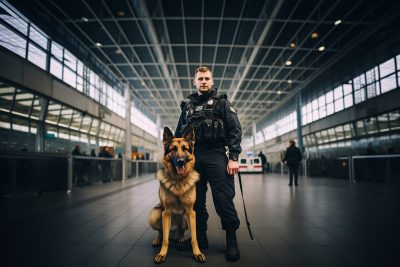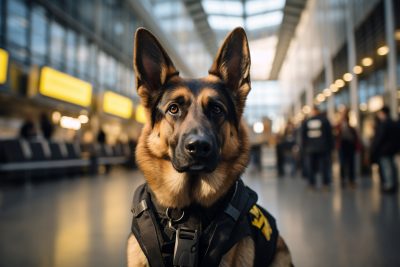Airport Police
A career as an airport police officer is an exciting and challenging field, involving the protection and safety of both passengers and employees at airports. Airport police officers are responsible for maintaining order on the grounds of an airport and ensuring the safe movement of people and goods in compliance with federal regulations and local laws. This job requires a high level of commitment and dedication due to the dynamic environment found in airports.
Airport police officers generally have jurisdiction over all areas on the airport grounds, including landside (non-secure) areas such as parking lots, terminal buildings, runways, taxiways, perimeter roads, and airside (secure) areas such as concourses, boarding gates, inspection points, fueling stations, cargo facilities and restricted areas. As such, they play a vital role in providing public safety within airports by patrolling these areas to detect suspicious activity or criminal behavior. These officers may also be asked to respond to emergency situations such as accidents or fires. In addition to providing general security services 24/7 around an airport facility, they are responsible for enforcing laws related to aviation security; responding to crimes in progress; apprehending suspects; issuing citations or warnings; conducting investigations; protecting airline personnel from harm; operating metal detectors; examining baggage; escorting passengers between terminals or aircraft when necessary; preventing hazardous materials from being smuggled into secure areas; and performing other duties assigned by their employer.
Airport police officers must possess excellent communication skills in order to effectively interact with both airport personnel and travelers. They must also have excellent judgment so that they can appropriately assess each situation that arises during their tenure. Officers must also have a keen eye for detail so that they can spot suspicious items quickly while patrolling their assigned area. To ensure the highest level of safety for passengers at an airport facility, officers must remain vigilant even when there doesn’t seem to be any immediate danger present.
The daily duties of a typical airport police officer will vary depending on the size of their assigned facility but typically include: conducting security checks; patrolling perimeters inside/outside the facility using radar units and mobile/foot patrols; monitoring access control systems such as CCTV cameras or motion detectors; questioning persons entering or leaving secure areas who do not appear authorized personnel; writing reports on activities logged while on patrol duty; responding promptly to emergencies or alarms triggered by security systems installed at various points throughout the premises by investigating it thoroughly before taking action where required; appearing in court if required due to their duties conducted while working on site etc.; assisting other law enforcement agencies where needed during investigations; making arrests as required.
Airport Police

Basic Requirements
Airport Police officers require additional training, certification, and expertise to perform effectively and address specific security challenges and risks within airport environments. Airport Police officers in these roles play a crucial role in enhancing airport security, responding to emergencies, and ensuring the safety and security of passengers, employees, and airport stakeholders. Basic requirements to become an Airport Police officer may include:




The hiring process begins with candidates submitting an online application, which typically includes their personal information, education, and work experience. The agency will then go through an initial screening process to ensure that the applicants meet the minimum qualifications for the position, such as age, education, and citizenship status requirements.
Candidates who pass the initial screening will then be invited to take a written examination to assess various skills and aptitudes, such as critical thinking, decision-making, memory recall, and report writing. This will help ensure that the candidates have the foundational knowledge necessary for success in a law enforcement career.
To ensure that candidates have the requisite physical abilities to perform their duties, they will have to successfully complete a physical fitness test. This test may include events such as running, push-ups, sit-ups, and other exercises that assess stamina, strength, and agility.
After successfully completing the previous steps, candidates will be invited for an oral interview with agency representatives. This is a critical opportunity for both the agency and the candidate to assess their compatibility and for the candidate to demonstrate their interpersonal skills, problem-solving abilities, and commitment to law enforcement. In many cases, if an applicant successfully passes the oral board, they may be issued a conditional offer at this stage.
Law enforcement agencies conduct thorough background investigations on candidates to ensure that they possess the moral character and integrity needed for the job. The investigation may include interviews with family, friends, neighbors, employers, and others who can provide insight into the candidate's character. Additionally, candidates may be subjected to credit checks, driving record reviews, and criminal history checks.
To assess a candidate's emotional and mental stability, they may undergo a psychological evaluation. This process may include interviews with a Psychologist or Psychiatrist, as well as written tests that assess personality traits and mental stability. In most cases, the Psychologist or Psychiatrist will have access to the details of the background investigation.
Many agencies require a polygraph examination to verify the truthfulness of the information provided by candidates during the application process. This step aims to detect any omission or falsification of information, which could disqualify an applicant from the law enforcement profession.
Candidates must pass a comprehensive medical examination to ensure that they are in good health and physically capable of performing the demanding tasks associated with law enforcement work. The examination includes vision and hearing tests, as well as a thorough assessment of their overall medical condition.
Upon a final offer of employment, having successfully satisfied the requirements of the hiring process, successful candidates will attend an agency-sponsored training academy. Some agencies require their officers to participate in a field training program prior to the academy. Other agencies require the candidates complete the academy before starting their field training program. This structured program provides extensive academic, physical, and practical training on the knowledge, skills, and abilities necessary for a career in law enforcement.
After graduating from the academy, new officers will enter a probationary period, working under the supervision of experienced colleagues. This phase allows officers to practically apply their training on the job and provides the agency with an opportunity to evaluate their performance and readiness for independent duty. This timeframe can vary between 12 months all the way to 24 months.
Disclaimer:

Airport Law Enforcement
As an Airport Police officer, specialized duty assignments can encompass a variety of roles and responsibilities tailored to the unique security and safety needs of airports. Some of the specialized duty assignments that Airport Police officers may be assigned to include:







